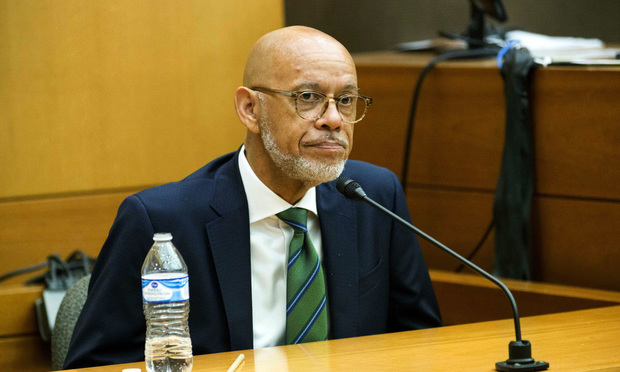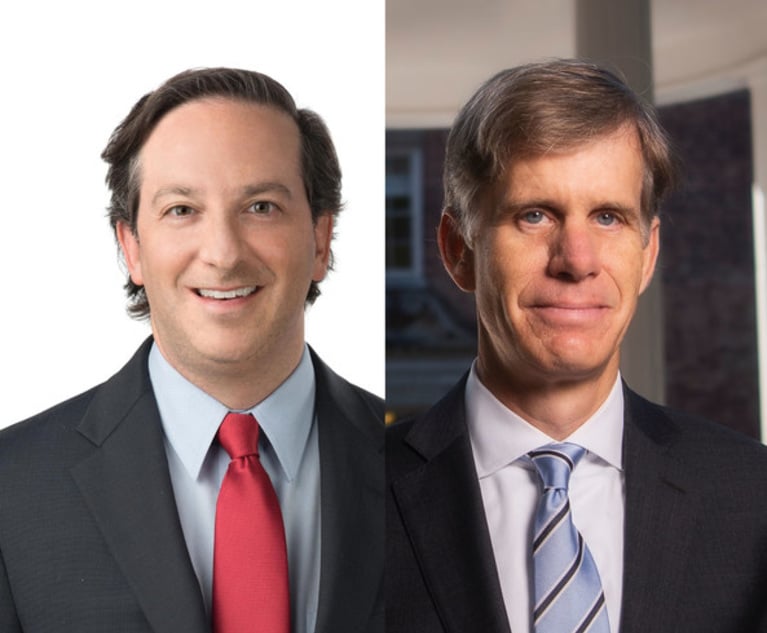State Rests Murder Case Against Tex McIver After 16 Days of Testimony
After he was charged with felony involuntary manslaughter and reckless conduct over the fatal shooting of his wife, Tex McIver told a longtime Atlanta media consultant that he could share a success bonus with the county district attorney.
April 10, 2018 at 03:55 PM
7 minute read

Fulton County prosecutors rested their murder case against Claud “Tex” McIver after 16 days of testimony, but not before a former media consultant testified Tuesday that the attorney suggested he could share a “success bonus” with Fulton County District Attorney Paul Howard if the DA reduced or dropped criminal charges against him.
Defense lawyers presented a single witness—the chief financial officer of a kaolin mining company in which McIver had held a 10 percent interest until he sold it in January 2017—before launching into arguments intended to persuade Fulton County Chief Judge Robert McBurney to toss out three counts of influencing witnesses.
The testimony of McKenzie Davenport, the chief financial officer of Arcilla Mining and Land Co., appeared to be an effort to at least partially rehabilitate McIver's 2017 financial statements prosecutors claimed he vastly overestimated. Prosecutors have presented expert forensic accounting testimony suggesting McIver was broke and, without his wife's cash infusions, would have had negative bank balances totaling more than $5,000 when he shot her from the back seat of the couple's SUV. Prosecutors contended that gave him ample motive for murder.
Once Davenport testified, defense attorney Don Samuel appeared to score at least some points with McBurney in arguing that the judge ought to dismiss the influencing witnesses charges.
In addition to malice murder, felony murder and assault with a deadly weapon, McIver is also charged with influencing witnesses Dani Jo Carter, who was driving the McIvers' SUV through downtown Atlanta when he shot his wife, Diane; Dani Jo Carter's husband, Tom Carter; and Bill Crane, one of McIver two spokesmen who communicated to the media some version of McIver's shifting narrative about how he shot his wife.
Samuel argued that McIver wasn't attempting to silence Dani Jo Carter or, by extension, influence any statement she might make to police investigating the shooting when he called Tom Carter to say his wife was “about to send me to prison.”
“Never was that phone call interpreted by anybody to say, 'Don't talk to the police. Stop talking to the police,'” Samuel argued. “It was the exact opposite.”
Testimony by prosecution witnesses demonstrated that McIver was attempting to persuade Dani Jo Carter to go public with her story of the shooting, Samuel said, which she told police was an accident.
“It had nothing to do with law enforcement officers. It had nothing to do with ceasing communication,” Samuel argued. “It was 180 degrees opposite. It was, 'Go talk to the people. We need them better informed.'”
Urging Dani Jo Carter to speak to his lawyer and the media about the shooting, Samuel said, is akin to “me yelling at my lawyer, 'Go out in the press. Stand up for me.' … Where is the lie?”
Samuel also argued the influencing charge linked to Crane should be dismissed because it referred to numerous attempts by McIver to get Crane to retract statements he had made to the media that McIver was holding his gun in the SUV because he feared Black Lives Matter protesters.
Crane testified Monday that McIver approved the statement and saw nothing wrong with it once it was published—until his fellow law partners at Fisher & Phillips urged him to retract it. McIver retired after his arrest in December 2016.
But Samuel said it's not a crime to lie to the media. Prosecutors, he said, “are saying that lying to the press is a crime.” If that's so, he added, “There are a lot of us who are in trouble.”
McBurney took the defense motion for a directed verdict under advisement.
A former media consultant also testified Tuesday that Claud “Tex” McIver told him he could share a “success bonus” with Fulton County District Attorney Paul Howard if the prosecutor reduced or dropped criminal charges filed in the death of the lawyer's wife.
Jeff Dickerson, a former journalist who described himself as a crisis communications consultant, said he was contacted by one of McIver's representatives in late December 2016. That led to a meeting with McIver and his then-counsel Stephen Maples, Dickerson said.
McIver reached out to Dickerson within a week of his arrest on charges of felony involuntary manslaughter and reckless conduct stemming from the Sept. 25, 2016, fatal shooting of his wife, Diane. McIver was free on a $200,000 bond at the time.
McIver eventually became the subject of national and international media stories stemming from comments Bill Crane, a friend and spokesman, made about McIver asking for his gun because he was wary of Black Lives Matter protesters as the couple and a friend drove through downtown Atlanta.
During a meeting between McIver, Maples and Dickerson, McIver explained the shooting was an accident and that he fell asleep with the gun in his lap, only to awaken when it fired, Dickerson said.
Dickerson said he's known Howard for more than 30 years and told McIver and Maples he could help, “because I knew Mr. Howard and would be able to reach out to him.”
Maples left the room at one point during that meeting, Dickerson testified. That's when McIver offered a “success bonus,” if Dickerson persuaded Howard to drop or reduce the pending criminal charges, he testified.
And, Dickerson said, McIver added, “It would be OK with him—those were his words—if I shared that with others.”
Dickerson said he was initially puzzled.
“The offer to share it with others was vague,” he explained. “I really didn't know who else he might have on his team he would want me to share it with. I asked for a clarification.”
The response left him with the clear impression McIver meant Dickerson could share that bonus with the district attorney, Dickerson said.
“When it became clearer to me he was talking about sharing money with the district attorney, I told him in no uncertain terms I would never make such an offer to the district attorney and that he would never accept it,” Dickerson said. “It would have been, at the very least, an unethical thing to do and at most illegal. Criminal.”
Dickerson said McIver's overture didn't stop him from taking a job as a consultant on the former Fisher & Phillips' partner's legal defense team. Dickerson said he soon reached out to Howard via text message to set up a meeting. When Howard learned Dickerson wanted to talk about McIver, he broke off contact.
McIver was disappointed and urged him to try again, Dickerson said.
“I did not try again. I got the message loud and clear the first time from Mr. Howard,” Dickerson said.
McIver never mentioned any dollar amount when he first referenced the bonus, Dickerson testified. “I didn't know if the district attorney would respond to an overture, so it seemed premature to talk to a bonus or success fee related to reducing or eliminating charges,” he said.
Dickerson said he remained associated with McIver's legal team for about four months. During that time, he received at least four checks totaling $9,000 that were paid from Diane McIver's estate.
Dickerson said he was let go in late April 2017 after McIver was indicted on charges for malice murder, felony murder and influencing witness and his bond revoked.
McIver defense attorney Don Samuel suggested during his questioning Tuesday that success bonus aren't unusual in Dickerson's business, which Dickerson agreed with.
Samuel suggested that, when McIver offered Dickerson the bonus, he never specifically suggested Dickerson pay some of it to the district attorney.
“Does he [McIver] say you could share the money with anybody you want to?” Samuel asked.
“Correct,” Dickerson replied.
“He didn't say, 'Offer Paul Howard money?'” Samuel asked. “He didn't say, 'Tell Paul Howard there is money in this for him?'”
“He did not say those words,” Dickerson said.
This content has been archived. It is available through our partners, LexisNexis® and Bloomberg Law.
To view this content, please continue to their sites.
Not a Lexis Subscriber?
Subscribe Now
Not a Bloomberg Law Subscriber?
Subscribe Now
NOT FOR REPRINT
© 2025 ALM Global, LLC, All Rights Reserved. Request academic re-use from www.copyright.com. All other uses, submit a request to [email protected]. For more information visit Asset & Logo Licensing.
You Might Like
View All


On The Move: Ex-Partner Returns to Lead Nelson Mullins Corporate Group, Burr & Forman Hires University GC as COO
5 minute read
Law Firm Sued for Telemarketing Calls to Customers on Do Not Call Registry
Trending Stories
- 1Midsize Firm Bressler Amery Absorbs Austin Boutique, Gaining Four Lawyers
- 2Bill Would Allow Californians to Sue Big Oil for Climate-Linked Wildfires, Floods
- 3LinkedIn Suit Says Millions of Profiles Scraped by Singapore Firm’s Fake Accounts
- 4Supreme Court Agrees to Hear Lawsuit Over FBI Raid at Wrong House
- 5What It Takes to Connect With Millennial Jurors
Who Got The Work
J. Brugh Lower of Gibbons has entered an appearance for industrial equipment supplier Devco Corporation in a pending trademark infringement lawsuit. The suit, accusing the defendant of selling knock-off Graco products, was filed Dec. 18 in New Jersey District Court by Rivkin Radler on behalf of Graco Inc. and Graco Minnesota. The case, assigned to U.S. District Judge Zahid N. Quraishi, is 3:24-cv-11294, Graco Inc. et al v. Devco Corporation.
Who Got The Work
Rebecca Maller-Stein and Kent A. Yalowitz of Arnold & Porter Kaye Scholer have entered their appearances for Hanaco Venture Capital and its executives, Lior Prosor and David Frankel, in a pending securities lawsuit. The action, filed on Dec. 24 in New York Southern District Court by Zell, Aron & Co. on behalf of Goldeneye Advisors, accuses the defendants of negligently and fraudulently managing the plaintiff's $1 million investment. The case, assigned to U.S. District Judge Vernon S. Broderick, is 1:24-cv-09918, Goldeneye Advisors, LLC v. Hanaco Venture Capital, Ltd. et al.
Who Got The Work
Attorneys from A&O Shearman has stepped in as defense counsel for Toronto-Dominion Bank and other defendants in a pending securities class action. The suit, filed Dec. 11 in New York Southern District Court by Bleichmar Fonti & Auld, accuses the defendants of concealing the bank's 'pervasive' deficiencies in regards to its compliance with the Bank Secrecy Act and the quality of its anti-money laundering controls. The case, assigned to U.S. District Judge Arun Subramanian, is 1:24-cv-09445, Gonzalez v. The Toronto-Dominion Bank et al.
Who Got The Work
Crown Castle International, a Pennsylvania company providing shared communications infrastructure, has turned to Luke D. Wolf of Gordon Rees Scully Mansukhani to fend off a pending breach-of-contract lawsuit. The court action, filed Nov. 25 in Michigan Eastern District Court by Hooper Hathaway PC on behalf of The Town Residences LLC, accuses Crown Castle of failing to transfer approximately $30,000 in utility payments from T-Mobile in breach of a roof-top lease and assignment agreement. The case, assigned to U.S. District Judge Susan K. Declercq, is 2:24-cv-13131, The Town Residences LLC v. T-Mobile US, Inc. et al.
Who Got The Work
Wilfred P. Coronato and Daniel M. Schwartz of McCarter & English have stepped in as defense counsel to Electrolux Home Products Inc. in a pending product liability lawsuit. The court action, filed Nov. 26 in New York Eastern District Court by Poulos Lopiccolo PC and Nagel Rice LLP on behalf of David Stern, alleges that the defendant's refrigerators’ drawers and shelving repeatedly break and fall apart within months after purchase. The case, assigned to U.S. District Judge Joan M. Azrack, is 2:24-cv-08204, Stern v. Electrolux Home Products, Inc.
Featured Firms
Law Offices of Gary Martin Hays & Associates, P.C.
(470) 294-1674
Law Offices of Mark E. Salomone
(857) 444-6468
Smith & Hassler
(713) 739-1250






